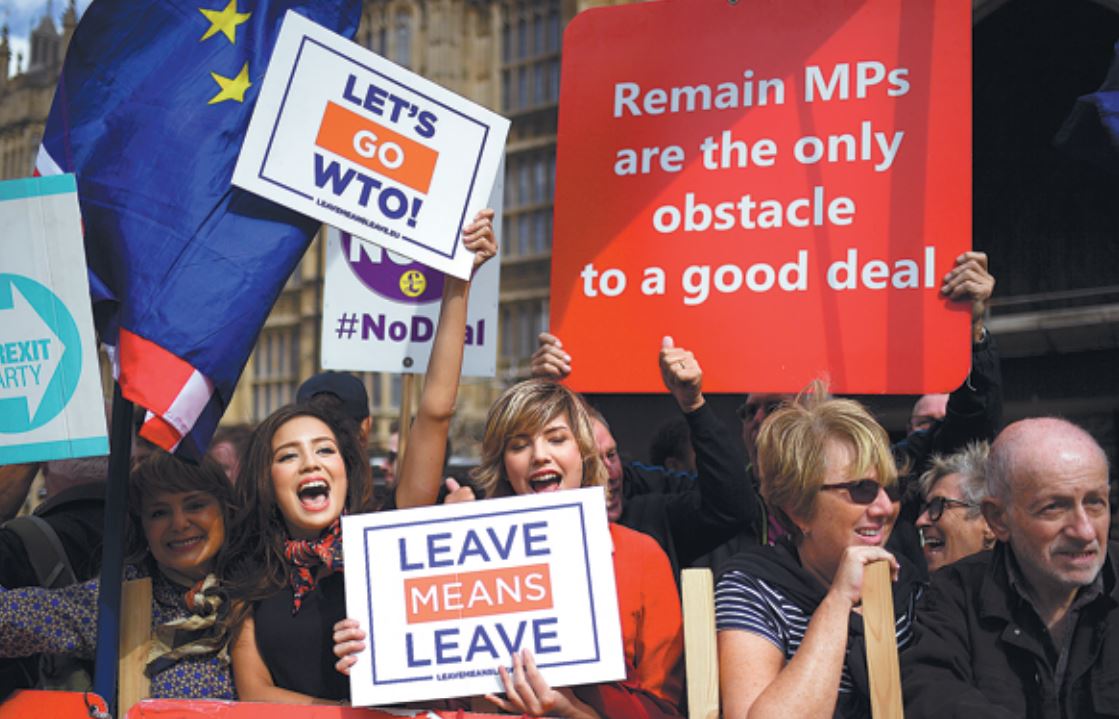PM's no-deal Brexit plan suffers blow
By JONATHAN POWELL | China Daily Global | Updated: 2019-09-06 09:12

British MPs strip Johnson's majority, pave way for deadline extension for leaving EU
British lawmakers opposed to a no-deal Brexit this week wrested control of the parliamentary agenda from Prime Minister Boris Johnson, stripping his working majority and paving the way for a third extension to the deadline for the United Kingdom's departure from the European Union.
The prime minister also faces being unable to carry out his threat of calling a snap election after suffering a humiliating defeat in his first Commons vote, which seeks to introduce legislation to force a further Brexit delay, from Oct 31 to Jan 31.
After two years of saying they want an election, the Labour Party may now decide it won't approve one on the prime minister's terms, and only if a no-deal Brexit is blocked by law.
But the government may find a way to bring about an election anyway. Oct 15 is Johnson's proclaimed date of choice for a poll, which is two days before the EU summit at which the prime minister hopes to strike a new withdrawal deal, and would be 17 days before the Oct 31 Brexit deadline, which is Johnson's EU departure day "No ifs or buts".
In measuring the pros and cons, Johnson has opted for publishing a motion under the Fixed-term Parliaments Act to bring the date of the next election forward from 2022.
This option is the fastest route to an election as it only needs the Commons to pass it. It would be debated in the House of Lords, but isn't amendable, which means rebel MPs wouldn't be able to slip an extension to membership of the EU into it.
It would require two-thirds of MPs to back it, so the government would need Labour support and that looks in doubt, as Labour fears Johnson will set an election date for after Oct 31, ensuring Brexit happens no matter what.
The government could circumvent the requirement of needing a two-thirds majority through what's called a short bill, which includes the legal wording that, "notwithstanding the Fixed-term Parliament Act, the government is calling an election".
For Johnson, this would be favorable as it only needs a simple majority of MPs to opt for it, but it has to be passed by the Commons and the Lords, so it would take longer than the option being proposed. A disadvantage for the PM is that it could be amended, so MPs could amend it to block no-deal.
For rebel MPs and opposition, a short bill might be favorable because it provides a way to set the date of the election in stone.
Another way to reach an election is if a motion of no confidence is passed in the government and after a period of 14 days, no other alternative government commands the confidence of a majority of MPs. The PM would effectively be asking his own MPs, among others, to vote against his government. This option would only be used as a last resort as it would appear a desperate move.
The prime minister's strategy, in order to keep no-deal on the table, very much depends on what happens with the process of the Brexit delay bill this week.
Even if a general election is called, the bill, once enacted, will actually require the prime minister to seek an extension if there is no new withdrawal deal agreed by Oct 19.
Johnson's decision to ask the queen to suspend Parliament, from sometime next week, means the clock is ticking for MPs to avert a no-deal scenario.
The House of Lords has an important role now, as it may add amendments to the Brexit delay bill that would use up more time, creating difficulty for its proponents.
It's thought that the Lords will attempt to push through the bill, and it could be passed by Friday. However, even if the bill is passed by then it may not be over the line in law, as any legislation can be repealed. Johnson's government, if it doesn't like the result, may consider not presenting it to the queen for royal assent, the method by which a monarch formally approves an act of the legislature. If this were the case, it would be a serious meltdown in the relationship between government and Parliament.
Angus McNeice in London contributed to this story.
























